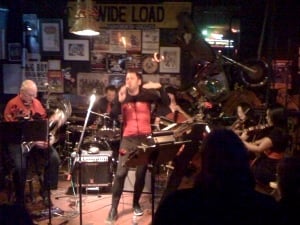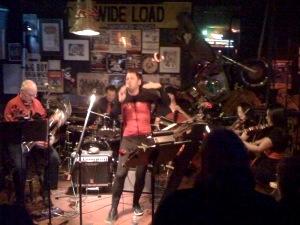The Jack Dubowsky Ensemble had its work cut out for it last Thursday at San Francisco's Eagle Tavern. The plan: Play through Depeche Mode’s classic 1990 album Violator with a small chamber group consisting of a few strings, trombone, and drums. Take an album of synthesizers and drum machines and score it for (mostly) acoustic instruments. This type of reinterpretation has the potential to delight when the performers find new inroads to the source material by turning it on its head. In the event, though, the group just seemed out of its element.

Built around Dubowsky’s interest in improvisation and unusual instrument combinations, the Ensemble is more at home creating interesting ambient textures and scoring movie soundtracks. Dubowsky and his trombonist seemed particularly uncomfortable with their singing duties. Dubowsky read most of the lyrics off a music stand and the two rarely sang in tune. The Ensemble, for the most part, treated the music professionally, but was so poorly amplified that we missed out on the natural richness of the instrumentation.
Confining its play to a well-known and much-beloved work made the Ensemble’s job all the harder. There were a handful of audience members who were clearly Depeche Mode fans. They seemed intrigued by the possibilities of such an interesting concept. Some sang straight through the set, appearing to love every minute. I could almost swear that the four hipsters standing in front of me stepped from my high school senior year into a time machine that deposited them at the door of the venue. But for every one of those there was another audience member looking bewildered.
It didn’t help that the Dubowsky Ensemble was the opening act for the Monks of Doom. Most of the Eagle Tavern regulars spent their time drinking on the patio (possibly enjoying one of the first decent San Francisco nights in quite a while). The Monks of Doom filled the hall with their own cult following, which just didn’t seem interested in the Dubowsky Ensemble’s wares. One telling point came during “Personal Jesus,” when Dubowsky’s over-the-head hand-clap gesture was met with a chorus of folded arms.
As the evening progressed, Dubowsky shifted from an uncomfortable fussiness to a slightly more relaxed rapport with the audience. Toward the end his banter gave the whole evening the air of a lark. I don’t know whether he meant it that way, or was just engaged in some self-preservation. Unfortunately, he had lost a fair portion of the audience by that point.
Yet somewhere, buried in the din of failing pickups, fits, starts, and poor sound mixing, was a whale of an idea. Every once in a while a great string part would pop through the texture. As a composer, Dubowsky clearly knows what he is doing. At one point, the trombonist jettisoned his malfunctioning guitar pedal system and played straight into the mic. It sounded great. I couldn’t help but wonder what this sounded like in rehearsal. I would definitely be interested to hear it in a nice wood-paneled room with no microphones.
I'm still intrigued by the possibilities this concert implied. Dubowsky is right in thinking that this type of ensemble could really do justice to a Depeche Mode album. Power bands, like heavy metal's Metallica or the Scorpions, are well suited to the massive sound of an orchestra. Depeche Mode and their ilk work best when you can hear all the intersecting lines. The delicate sound of a single horn floating over the gothic changes in “Waiting for the Night” has the potential to sound like magic. In a sense, this is what any classical music performer does: find a new way to access a piece that has been played by others for decades or centuries. Anything is fair game, with this type of ensemble, regardless of the audience for which it was originally composed. 2010 isn’t over just yet. Anyone else want to step up to the plate and take on The Cure’s 1990 masterpiece Disintegration? I’ll go.

